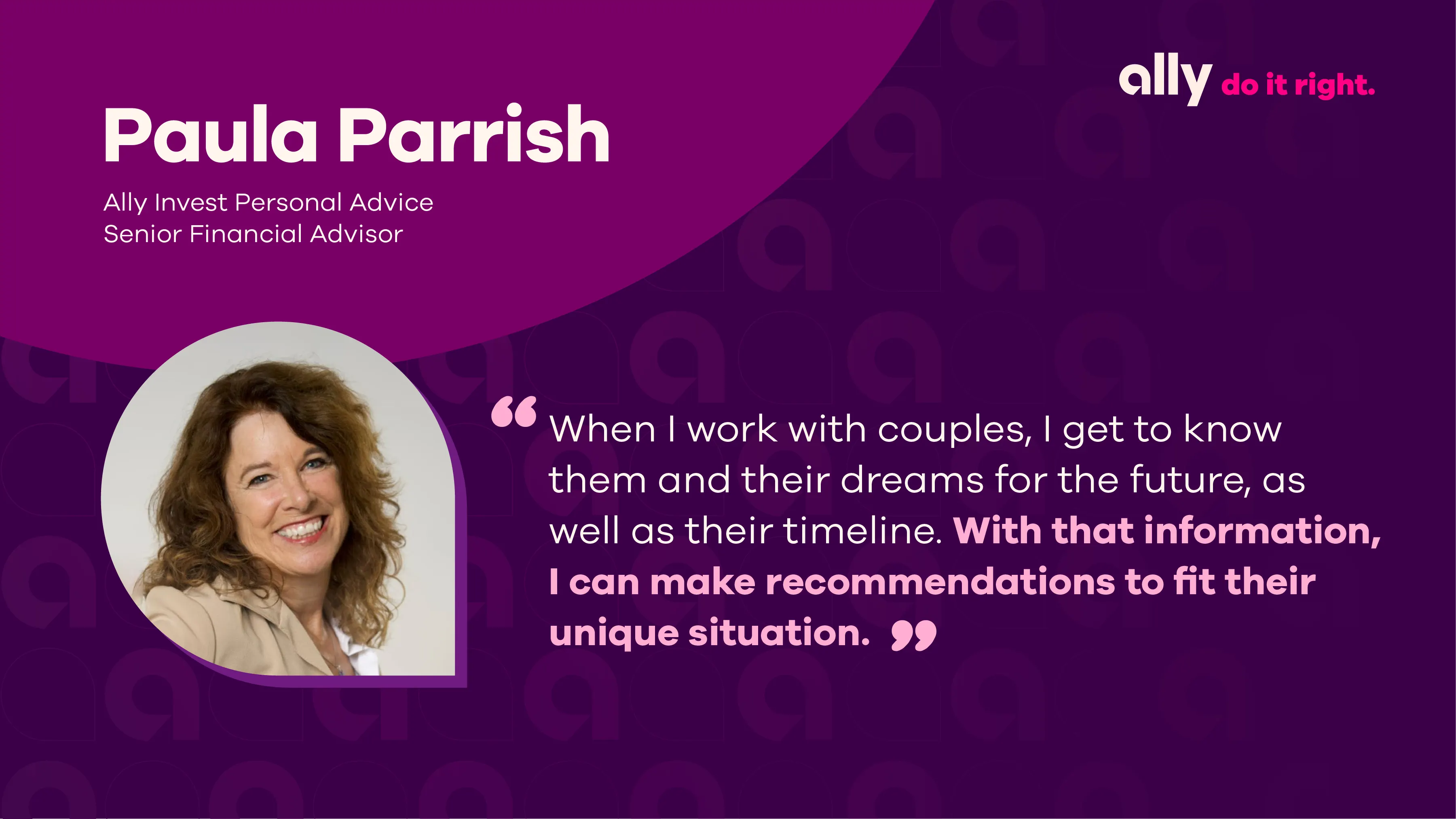What we'll cover
Common issues when investing with a partner
Best practices to navigate differences
How to invest successfully as a couple
Many couples don’t see eye to eye on all aspects of money management — especially when it comes to an investing strategy. But that doesn’t mean you can’t meet in the middle.
We spoke to Ally Invest Senior Financial Advisor Paula Parrish to get her insights on how she helps couples navigate investing together.

Learn more: How can a financial advisor help you manage finances as a couple?
1. Talk about money early and often
Your attitude toward money is largely influenced by your formative experiences with finances.
“Everyone has stories in their head about money — whether what they tell themselves is true or healthy or not,” says Parrish. “I always talk to couples individually and then together. I often find they haven’t discussed a lot of financial issues, so it’s crucial to make sure they know where each other stands.”
Read more: Uncover your money story and share it with your partner.
“We’ve learned that one of the most important factors in how somebody invests or makes financial decisions comes from the economic environment they were in during their early adulthood,” says Parrish.
She points to millennials who entered the workforce during the Great Recession and witnessed job loss and plunging real estate values. That experience, Parrish finds, may lead to a more risk averse mindset.
Parrish encourages couples to talk about money early and often, so each partner understands the other’s money values and beliefs. If these discussions are difficult, a financial advisor can be a valuable third party to facilitate the conversation and ask the right questions.
Your attitude toward money is largely influenced by your formative experiences with finances.
2. Consider the marriage factor
While you might share a life and even a bank account with your partner, if you’re not married, it makes a big difference in how your investments are protected — or not. As a general rule, each spouse is entitled to half the assets acquired during the marriage in the event of divorce. If you’re not married, you have no such entitlements to your partner’s assets.
“If you and your partner are considering marriage, discuss how it will affect your finances,” says Parrish. “Marriage changes many money issues from a legal perspective, so it’s important to be on the same page.”
3. Meet halfway
Like with most other challenges in a relationship, you and your partner are not always going to be on the same page. Parrish recommends couples make a point to talk about their financial and investment goals on a regular basis and adjust their investment strategies to meet their needs as their lives evolve.
“There are many different ways to invest and many paths to achieve the same goals,” says Parrish. “You might even have different goals. As long as everything is on the table, you can talk it out and find a solution that works for both people.”
4. Find the right investing style as a couple
You don’t have to agree on everything to come up with an investing strategy that works for you both. Explore your options and find a solution that fits your needs.
Go hands-off with a robo portfolio
A robo portfolio is a great choice for couples because once you set your investment goals, you don’t have to argue over further decisions. Everything is automated.
Learn more: Choose an Ally Invest Robo Portfolio that aligns with your goals as a couple
Get expert advice from a financial advisor
Working with an advisor can give you a third-party opinion and guidance to help you make the best decisions as a couple.
“When I work with couples, I get to know them and their dreams for the future,” says Parrish. “With that information, I can make recommendations to fit their unique situation. For instance, if they want to buy a home in the near future, I know they’ll need money set aside for a down payment. On the other hand, if they’re focused on financial independence later on in life and don't need that money for the next 15-20 years, we can take on more risk.”
Learn more: An Ally Invest Financial Advisor will tailor your financial plan to you personally
Invest together
You and your partner don’t have to agree on everything to successfully invest together. With a little compromise and transparency, you can come up with the investment strategy that works for you both.



